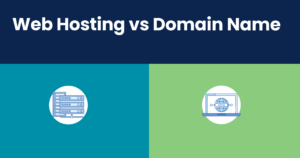DOMAIN NAME
A domain name often referred to as “web address”, is the address that people type into a browser address bar to find your website. It’s what comes after ‘@’ in an email address, or after ‘www.’ in a web address. A registered domain name is unique to you and can’t be used by anyone else, as it functions on the Internet in a similar way to a street address in the physical world.
Examples of domain names are:
vividblock.com
google.com
wikipedia.org
youtube.com
Why Do You Need a Domain Name?
Any business, organization or individual striving to establish an online presence should own a domain name. A combination of a domain name, website, and email address forms your unique identity online. That, in turn, helps your business create a professional look, increase brand awareness, build credibility, and protect your trademarks and copyrights.
What is the difference between a domain and a subdomain?
Domain (e.g., oberlo.com) is the web address you buy from a domain registry. A subdomain (e.g., service.vividblock.com) is a subset of a domain that can be created by a domain owner.
Domain Name Types
Top-Level Domain (TLD) refers to the suffix or the last part of a domain name. There’s a limited list of predefined suffixes which includes:
- .com – commercial business (the most common TLD)
- .org – organizations (typically, nonprofit)
- .gov – government agencies
- .edu – educational institutions
- .net – network organizations
TLDs are classified into two broad categories: generic top-level domains (gTLDs) and country-code top-level domains (ccTLDs).
Generic Top-Level Domain (gTLDs) is a generic top-level domain name that identifies the domain class it is associated with (.com, .org, .edu, etc).
Country Code Top-Level Domain (ccTLD) is a two-letter domain extension, such as .uk or .fr, assigned to a country, geographic location or territory.
nTLDs refers to new top-level domain names that are geared towards brands organizations and services, as they’re more customized, flexible and relevant. Examples of nTLDs include “.store”, “.app”, “.tech”, “.cool”, etc.
How to Choose a Domain Name?
- Choose a name that’s easy to type and pronounce. If people struggle to spell it or pronounce it correctly, it will affect the memorability of the name and hurt your brand.
- Pick a domain name that can be turned into a brand. You don’t want exact and partial keyword match domain names because they’re too generic and very difficult to brand. You should also steer clear from numbers and hyphens in your domain name – they’re too difficult to remember and pronounce.
- Keep it short and simple. Long, complex domain names run a huge risk of being mistyped and misspelt. That’s just an unnecessary headache.
- Avoid names that can be confused with existing brands. If you think you can piggyback on some other brand’s success, you’re hugely mistaken. Brand confusion will be the least of your concerns when you get sued!
- Use an appropriate extension. With the new TLDs rocking the internet, you’d think everyone’s going for something as eye-catching as “.boutique”. Yet the prevailing advice among marketers is to stick to the old good “.com”, merely because it’s the most recognized suffix outside the tech world. If you’re targeting a local market, then ccTLDs is probably a better choice for your business.
- Choose a name that indicates what your business does. You must be careful not to get too literal. But a clever domain name that suggests to consumers what they can expect to find when they land on your site is a great advantage to any business.
Where Can You Buy a Domain Name?
You will need to pay an annual fee to register a domain name. When the registration period expires, you will be given the option to renew. If you don’t, the domain name will be made available to others.
Domain registrar
A domain registrar is a company that sells domain names that aren’t currently owned and are available for you to register. A simple search on a domain registrar’s page should tell you if the domain name that you want is available and how much it will cost.
There are quite a few domain name registrars out there, Godaddy.com, Hover.com, Google Domains and NameCheap are probably among the most popular ones.


